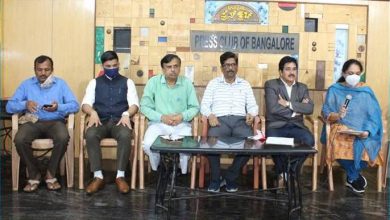Ministry of Jal Shakti holds meeting with all States for water conservation, rural drinking water supply and Swachh Bharat Mission (Grameen)
New Delhi: The Union Minister for Jal Shakti, Shri Gajendra Singh Shekhawat, held a review meeting with all State Ministers and State Principal Secretaries for Water Resources, Drinking Water and Sanitation and PHED in New Delhi today. The focus of the meeting was to review the steps taken and action plans made by various States for the drinking water and sanitation sectors in the country, especially their preparedness to conserve rainwater over the forthcoming monsoon months. 24 State Water and Sanitation Ministers joined the meeting to represent the sectors in their respective States.
Water conservation and rural drinking water
The Minister reviewed the initiatives taken by the States to address the current water situation in the country along with the implementation of action plans to conserve water during the upcoming monsoon season. He urged that Centre and States should work in the spirit of co-operative federalism as guided by the Prime Minister, Shri Narendra Modi. Further, he added that the newly created Jal Shakti Ministry will take forward the management of demand and supply of water under a single umbrella. He stressed that rational water use and recycling of water should be made a Jan Andolan, much like the Swachh Bharat Mission did for sanitation. He also requested the States to plan water harvesting and conservation in convergence with other programmes. In this context, he referred to the letter recently written by the Prime Minister to all sarpanches of the country, calling upon them to take up water conservation activities. He emphasized the importance of creating awareness among the masses on the need to conserve water.
Secretary (Drinking Water and Sanitation), Shri Parameswaran Iyer, said that it was for the first time that an integrated approach to Water is being adopted at the Central level. He mentioned that many of the attending Ministers had personally appreciated the speed with which the new Minister had convened a meeting with State Water Ministers at such a large scale, so early into his tenure.
He added that the Ministry is working on a new water supply programme to provide drinking water connections to rural households, and that such a programme can only be successful if various water conservation efforts, like point recharge, de-silting of minor irrigation tanks, use of grey water for agriculture are integrated and sustainability of the sources is ensured.
Secretary (Water Resources), Shri U P Singh, spoke about the overall water resources availability and the current issues faced due to water scarcity. He emphasized the need for demand management of water, specifically in agriculture by use of micro irrigation, and re-use of treated water. He urged all the State Governments to adopt an integrated approach to Water Resource Management by integrating efforts across different Departments involved in water at the State level.
Swachh Bharat Mission – Grameen (SBM-G)
With SBM-G in the last stage of implementation towards building an Open Defecation Free (ODF) India, the Minister set the agenda to achieve 100% sanitation coverage for all rural households at the earliest. He stressed that a Clean India is not a goal but a continuous process, adding that the Mission takes pride in having changed the sanitation behaviour of over 55 crore people. He also assured the States that there will continued support to sustain behaviour change.
Secretary (Drinking Water and Sanitation), Shri Parameswaran Iyer, spoke about the importance of developing mechanisms to sustain the SBM-G outcomes and stressed on the need for solid and liquid waste management in rural areas, taking India from ODF to ODF-plus. He stressed on the continuity of aspects such as communication, both IPC and Mass media, strengthening institutions and capacity building.
All State Ministers present at the meeting shared their State’s progress in sanitation and the future plans for post-ODF activities as well as water conservation and drinking water supply.

